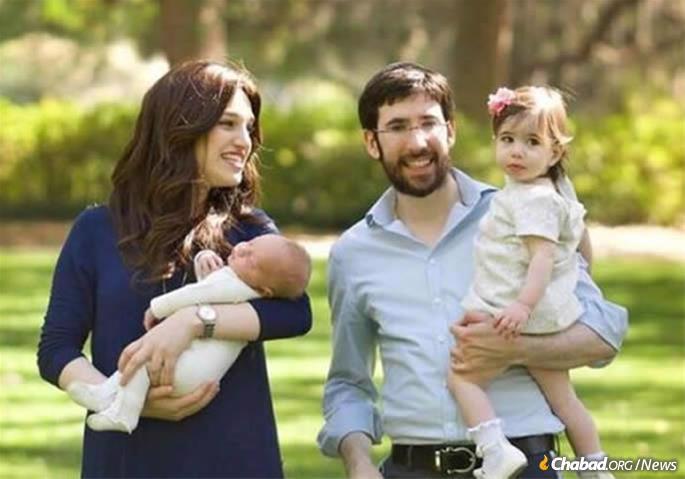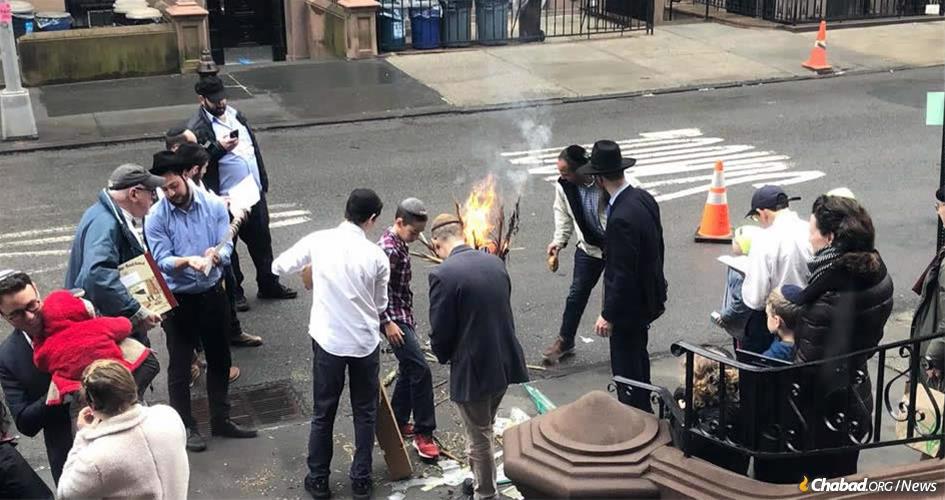Rabbi Zalman and Zelda Refson are getting ready to host their first Passover seders. Co-directors of Chabad of Savannah, Ga., they serve students from nearby schools and the broader Jewish community, which includes many young professionals and young families. At their seder, students from the nearby Savannah College of Art and Design will act out different parts of the story, such as the 10 plagues and four sons, says Rabbi Refson. “It’s a way to make it a little more interactive and interesting,” he says.
The couple, who moved to the area in December 2017 and had their second child the week before Passover last year, says they’re excited about hosting their first seder and also about the tremendous outpouring of interest it has generated. They’re expecting about 80 guests, including about a dozen out-of-town visitors on the first night, which they’ll host at a downtown venue, and about 45 for the second-night seder at their home.
For many, this will be their first time attending a seder, he adds. “One of the things we’re going to be emphasizing this year is the eternity of the Jewish people, the fact that we’re celebrating coming together as a people, and we’re doing the same things Jewish people have been doing for thousands of years. And by doing so, we reinsert the link in the chain of Jewish history—not just in the cosmic Jewish history, but in our family line.”
Around the world, Chabad centers will be opening their doors to welcome guests to thousands of seders in hundreds of cities around the globe for Passover, which starts on Friday night, April 19, and runs through Saturday night, April 27. Chabad-Lubavitch will also be distributing millions of shmurah matzahs, and holiday guides in 17 languages to help people prepare for Passover, which celebrates the deliverance of the Jewish people from slavery in Egypt.
Last-Minute Information, Seders, Chametz Sales
Chabad.org, the world’s largest Jewish faith-based website, is poised to see record-breaking traffic to its Passover site, Passover.org, with more than 7 million unique visitors expected during the 2019 holiday season.
The site offers an extensive selection of Passover guides, videos, songs, insights, recipes, holiday customs and the international seder directory.
For those still in search of a seder, the world’s largest seder directory, Chabad.org/seders, features events in hundreds of cities around the world, and is constantly being updated.
With more than 80,000 people selling their chametz through Chabad.org in 2018, website administrators say they are expecting even more to use the service this year. More than a million people around the world will sell their chametz via their local Chabad rabbi, either in person or via mail.
On Thursday after nightfall, Jews the world over will engage in bedikas chametz, thoroughly searching their homes for any remaining chametz. Friday morning is the time for burning the chametz. Before the fifth hour, Jews burn all chametz that was found during the search, and anything that was left over from breakfast and not stored with the chametz that will be sold to non-Jews. (This should have already been arranged with your rabbi, or online at Chabad.org.) To find your local chametz-eating and burning deadlines, click here.

Gathering Together in Baton Rouge
Rabbi Peretz and Chaya Mushka Kazen, co-directors of Chabad of Baton Rouge, La., are looking forward to hosting their fourth set of seders this year. Locals, visitors and students will come together to celebrate, though fewer students this year because it’s spring break at Louisiana State University, says Rabbi Kazen. They’re expecting about 80 guests between the two nights and some new faces, in addition to their regulars, including an Israeli athlete who reached out because he’ll be visiting town.
“What I enjoy most about the seder is how on the one hand, it has a structure and a formality to it, but at the same time, you’re spending several hours with people in a very informal kind of way. It’s not as formal as a typical service, and it’s not as formal as a class or a program; it has a very open kind of conversation that lends itself to and is a tremendous experience for myself, my wife and my children, as well as participants,” he says. The couple has three children, ages 1, 3 and 4.
Kazen adds that he hopes his guests come away with a sense of the relevance of Passover and the importance of their ability to exercise their religious freedom in celebrating it. “There’s an increasing need with each passing year to remember this isn’t something we do just because we grew up doing it,” he says. “We look back and say, ‘Wait a second! Is this just going to be family time, or is this something that’s going to be life-changing and uplifting, inspiring and empowering?’ And that’s something I think people do grapple with not just locally, but globally.”
In New Orleans, Rabbi Leibel Lipskier and his wife, Mushka, will be offering seders, as well as kosher-for-Passover meal plans for their student community. They’re expecting as many as 300 students, some of whom will bring their parents, but it’ll be a smaller crowd because of school break, he says. It’ll be a traditional seder, though everyone will bring their own traditions from home. “It’s very powerful, that many people and you get to hear so many traditions,” he says. “It seems to be everyone’s favorite holiday with the songs and traditions.”
Students help prepare for the holiday as well, he explains. “The students actually cut the vegetables, set the tables and serve, and are there; they’re coming together as a community,” says Lipskier. “It’s really powerful how the whole thing comes together.”

Their seders, which emphasize song, start early and some stay late. “It’s fun, engaging, and a sense of community and unity,” he says. “We want the students to know that their Jewish heritage isn’t a burden or a chore, but something that’s meaningful and enjoyable, and it’s something very special that they’re able to participate in.”
Meanwhile, in Charleston, S.C., co-directors Rabbi Yossi and Sarah Refson have been working hard to make sure people in their community can get Passover supplies at local supermarkets. Together with other Jewish groups in the area, they’ve helped put matzah, macaroons and more on the shelves. “Sometimes, it’s been a struggle to even find matzah,” he says. “This year, that’s not the case.”
The couple, which is holding their 10th set of seders, is preparing to host 300 guests between the two nights. Their seders are by invitation. “We look for people who are involved with us throughout the year or people we’re connected with,” he says. “It’s a way of bringing them into our family for Pesach.” Their four children will be in attendance, as well as some relatives from New York.
Rabbi Refson says he hopes people come away with a deeper connection to Passover and find relevance in their own lives to the Exodus story. “It’s not merely a historical story,” he says. “It’s a story that takes place in our lives every day.”








Start a Discussion